- Home
- Naguib Mahfouz
Cairo Modern Page 14
Cairo Modern Read online
Page 14
Then the young man told her delightedly, “Life spreads before us. Opportunities are in reach. So let’s dash into the flowers and pluck the fruit.”
Smiling with pearl-like teeth, she replied, “Let’s go and harvest.”
He said, “Pay no heed to the crusty maxims by which people define happiness. It’s not about life; all of life’s circumstances are comparable regarding happiness. It’s really a matter of willpower. Happiness will obey anyone who enjoys it by force of volition—willingly or not.”
She favored him with a thoughtful look of her extraordinary black eyes. Cautiously and humbly he continued, “If what you desire doesn’t exist, then desire what does.”
She replied calmly, “There’s no need for that.” Then, remembering a verse from al-Mutannabi, she recited, “Any place glory flourishes is fine.”
He took her hand as if proposing to her, hesitated a moment, and then said in a different tone of voice, “There’s one other thing. We shouldn’t live a solitary life. Let’s take life at large by storm and grab it with both hands.”
He wished to enjoy every advantage of his new social status and to sanctify its universally valued if fraudulent manifestations. His need to conceal the deviant aspects of his life was in play here. Therefore, he thought seriously about taking his bride to visit the Hamdis family to heal an old wound and to satisfy his desire to show off. But wasn’t there some genuine obstacle to this project?
32
He did not renounce his bold desire, wishing to make this the first step in his conquest of high society. He thought it wise to prepare the way for the visit by telephoning Hamdis Bey. He would be able to tell from the man’s response whether the Pyramids story had reached him yet or whether the resourceful girl had continued to keep it from her family. He placed a call to him and received a polite response. So he told Hamdis Bey of his marriage and revealed his desire to introduce his wife to them. The bey greeted the suggestion warmly. Mahgub rushed to tell his wife proudly and joyfully, “I want to introduce you to my important relatives.”
On the afternoon of the tenth day of his life in the new apartment they made their preparations for this important visit. Ihsan wore a beautiful dress from her new wardrobe and it highlighted her charming figure. Her magic was completed by the contrast between her jet-black hair, her pure, ivory complexion, and her rosy lips. The young man also shone, now that his health and looks were returning. They took a taxi to Zamalek. Ihsan felt some anxiety and misgivings, but Mahgub smiled as calmly and confidently as if he were heading for his childhood home. They crossed the garden on their way to the parlor, still nourishing these feelings, when they were astonished to see the noble family lined up to receive them at the entrance: Ahmad Bey Hamdis, his wife, Tahiya, and Fadil. Mahgub was delighted by this positive reception. He had been confident it would be a success, if only because women tend to want to scrutinize and criticize other women. They all greeted each other and shook hands. The impact his wife made on the receiving committee was not lost on his bulging eyes. So he felt relieved and rapturous. They sat down and continued to exchange greetings and pleasantries as his anxious eyes glanced everywhere, studying their faces. Without meaning to, he found himself comparing his beautiful wife to Tahiya Hamdis. Tahiya was beautiful, and her beauty had a stamp of elegance and refinement about it, but there was no way that she would be rated as exceptional. His wife was more beautiful than Tahiya. Indeed, she was more beautiful than Umm Tahiya in her prime. Their eyes did not deny or contest this fact. He was ecstatic and told himself with malicious delight: I was vanquished in the tomb on the day of the trip, but today I have my revenge. Wanting them to learn about his wife, he said with his normal temerity, as he pointed toward his girl, “Ihsan is the daughter of Shihata Bey Turki, a major tobacconist. Don’t you know him, Your Excellency?”
Ihsan blushed and looked down to hide her discomfort. For his part, Ahmad Bey Hamdis wrinkled his eyebrows as he searched his memory. Then he said apologetically, “Unfortunately I can’t place him.” Turning toward Ihsan, he added, “It’s our great honor!”
Gesturing toward his wife once more, the young man laughed and said, “She’s a former classmate; I met her at the university.”
The bey and his wife smiled, and Ihsan smiled as well. She was appalled by Mahgub’s recklessness, not knowing how far he would go. Fadil was looking languidly at the bride, but Tahiya could not take her piercing eyes off her. She had grasped the true motives tempting the young man to make this visit. So she felt even more contempt for him and her glances at the bride were clearly scornful and mocking. Hamdis Bey’s wife began to discuss the university’s women students, saying, “The university is a place to prepare for a career; that’s why Tahiya has chosen a different path.” She asked the bride, “Weren’t you planning to look for a job when you enrolled at the university?”
Ihsan, who was annoyed by this conversation and concerned about the consequences of lying, felt, nonetheless, that she must reply. “Of course, Ma’am, but everything is a matter of fate and destiny, as they say.”
Tahiya wickedly asked her, “Don’t you regret this change of plans?”
They all smiled, and Mahgub laughed, as though her taunt pleased him. He said, “God forgive me. Ihsan was a brilliant student. She frequently amazed M. Lechot, the philosophy professor, with her intelligence. He long opposed her departure from the program.”
He looked at Tahiya to check her eyes for the impact of his words. He found that she was gazing at him contemptuously and ironically. He did not feel angry. In fact, he was secretly delighted. Then a Nubian servant entered with refreshments. They drank with relish and silence prevailed, as if this were an intermission.
Hamdis Bey’s wife picked up the conversation again, dredging up old memories as she recalled the small boy who now made an appearance as a worthy husband and the head of a new household. She spoke of time, of its remarkable rapidity. Then she asked the young man, “How are your parents?”
“Praise God,” Mahgub answered quickly. Then he immediately felt depressed. The lady asked him, “Didn’t they attend your wedding?”
“They were prevented by my father’s ill health.”
After offering a prayer for the man’s full recovery, the lady asked, “How is al-Qanatir?”
“As beautiful as when you lived there.”
“It’s amazing; we haven’t been back since we moved.”
Smiling, Ahmad Bey Hamdis asked, “Are you spending your honeymoon in Cairo?”
Mahgub was delighted by this question because it opened new areas for conversation. He answered, “My position as secretary to Qasim Bey Fahmi doesn’t allow me any free time at present.”
At this point—to explain why they were in Cairo in July, in case there was any doubt in his mind—Tahiya said, “My father usually takes his vacation in August. Then we’ll all travel to Europe.” Changing her tone, she asked him with special emphasis, “Haven’t you taken Miss Ihsan to see the university’s excavations?”
His heart felt troubled, and he ran his eyes round the faces of those present. Finding that everyone was smiling and that there was no indication in their expressions of any suspicions, he sighed with relief. Controlling his emotions, he replied, “No.” Then he added spitefully, “We’ll no doubt go there soon, once we buy a car.”
Just as spitefully, she said, “The nicest trips are those on foot.”
Hamdis Bey asked about Qasim Bey Fahmi, who—he said—had been his comrade when they studied overseas. He promised to commend Mahgub to him. This link, which was unforeseen, troubled him. What would happen if Hamdis Bey discovered the secret behind his marriage? He felt an icy hand clutch his heart. Since this visit was merely a chance to get acquainted, he did not wish to prolong it. So he rose and they asked leave of their hosts.
On the way back, Ihsan snorted, “I take refuge in God from you!”
He guffawed and said sarcastically, “Be daring. Lying is as much a form of speech as telling the tru
th; but it’s more beneficial.”
“What if we’re found out?”
He replied with exasperation, “What if, what if—always what if. This phrase ‘what if’ is a recipe for failure. When inserted into a sentence, it negates the sentence’s usefulness and frustrates the protagonist’s intent. Don’t say, ‘what if.’ ”
Ihsan laughed and replied, “Your distinguished relative’s wife is a nice lady.”
Stealing a crafty look at her, he asked naughtily, “What about Tahiya? What a fine girl she is!”
Ihsan remained silent, not knowing what to say. Finally she stammered, “Right.”
He was watching her mischievously and felt supremely delighted. He returned to the apartment like a triumphal victor. The rest of the evening he felt grand, until the telephone rang. When he placed the receiver to his ear, he frowned and his enthusiasm for life waned, as if cold water had been thrown on his flaming heart, which had been dancing merrily. The speaker was Salim al-Ikhshidi, who informed him that the bey would be visiting the apartment the following evening.
33
He began to recite, “No wound hurts a dead man” the next day as evening approached and he was preparing to depart. Then he asked himself when his feeling of being wounded would die? He was supremely confident in himself and his philosophy, but his consternation made him feel that his philosophy—when it emerged from his brain to the world of realities—might encounter the same difficulties a projectile does on emerging from a cannon, when it explodes and disintegrates into fragments. He attempted to recover his normal sangfroid and coolheadedness. He tried to say “tuzz” but failed, or—as he put it—failed temporarily. He began to wonder whether she knew. Looking at the telephone, he conjectured that the bey had dispatched the happy news to her. The telephone was the apartment’s second pimp. What might her true feelings be? Was she delighted by this all-too-predictable tryst? Was she waiting for him eagerly or lackadaisically? Should this pretty head be split open as if it were a coconut to see what was inside? As the serpent of jealousy poisoned his heart, releasing its lethal venom, he left home and walked along Nagi Street without any destination in mind. The most he wanted was to regain his self-control or to return to his senses.
He found himself in front of a bar called “La Rose.” So he made for it without any hesitation, as though this had been his goal all along. People seeking beer were flocking there, fleeing from July’s scorching heat and thronging the sidewalk tables. Mahgub hated crowds and sought a place inside. The sole person near him was a young man who was alone with his drink. Within five minutes of his arrival Mahgub was raising a glass to his full lips and draining it. Then he clapped his hands to order another. He drank with uncharacteristic fervor, even though this was the first time in his life that he had set foot in a bar. His mind continued to reflect busily, not swayed by his surroundings. His anger at his anxiety was no less severe than his anxiety itself. It was intolerable that he should feel upset about a trifling value like those he had rebelliously rejected. Was it really his honor that was troubling him? What was honor? Hadn’t he freed himself from all those shackles? Of course he wasn’t angry about an affront to his honor. Honor wasn’t something a person should get agitated about. He was suffering from jealousy. He thought for a time and then asked himself: Is jealousy something natural or is it a social construct like honor? No, it’s definitely part of human nature. Animals suffer its burden just like men. We are jealous while in love as long as we think ourselves fit to be loved. That was what he told himself, without feeling fully convinced or relieved. Something still troubled him. Might not this jealousy threaten to destroy everything he had gained via his philosophy and liberation? He criticized, analyzed, and dissected, but all the same frightening images presented themselves. An automobile came to a stop in front of the Schleicher Building. The elegant bey got out, took the elevator, rang the doorbell. The door of the apartment opened. “Good evening, bride. Your real groom has arrived.” How would she receive him? In the same room on the same bed? He clapped his hands violently to order another drink.
Then he happened to notice the young man alone with his drink—his drinks. He realized that the man was staring at him with astonished delight. The young man had been observing him since he arrived and had noticed his agitation and involuntary gestures, wondering what was upsetting him. The delight and pleasure, however, were attributable to his advanced state of inebriation. When their eyes met, the man smiled. So Mahgub smiled back. Drunks make friends quickly, even if their affection is superficial. They exchanged greetings, and the stranger appeared to be appealing to his new friend for comfort in his loneliness, which inebriation had rendered unbearable. Mahgub sought refuge with him from his thoughts and sorrows and invited him to his table. In no time at all they were seated facing each other—two tipsy young men who attached no importance to anything. They introduced themselves. Then the young stranger said, “I saw you engage in a fierce debate with yourself and felt like intervening to comfort you.”
Mahgub laughed so loudly it was clear that sobriety had fled. He asked, “Was I really talking out loud?”
“Yes, you were furious … even spiteful.”
He was forced to speak because he had been invited to converse and because he felt like getting some things off his chest. He saw no harm in this, for his condition and his friend’s allowed for rash and impudent talk that was uncensored. He asked, “When does a man talk to himself?”
“On rare occasions.”
“Give me some examples.”
“In the flush of delight, during extraordinary grief, or in other conditions unrelated to either of these.”
“What does that leave?”
“Occasions when a man debates with another person.”
Clutching his glass, Mahgub observed anxiously, “I can hardly tell heads from tails.”
“Me too! In a social congress, as in a political one, it does not matter whether you understand what is said. The important thing is to say something.”
“Anything at all?”
“Whatever you feel like.”
This suggestion pleased him. So he cast thought aside and—his protruding eyes red from drink—began, “I’m in this room while the ram’s in the field.”
“Muhammad wrote down the lesson.”
“Work in your world as though you would die tomorrow and prepare for the next world as though you would live forever.”
“But you won’t live forever; you may not make it to tomorrow morning ‘cause you’re drinking too much.”
“Then let’s order another round.”
“What does the fact that bars are full of patrons suggest?”
“That the 1923 Constitution was better than the 1930 one.”
“Do you think the 1923 Constitution will return?”
“Where is it now?”
“In Saad Zaghlul’s tomb with the pharaohs’ corpses.”
“They should keep it there till we deserve it.”
“Are you a member of the Wafd Party?”
“No, I’m a Hanbali.”
“What’s the difference between the two?”
“A Hanbali becomes ritually impure just by thinking of a dog.”
“How about the Wafdist?”
“He becomes ritually impure just by thinking of patronage.”
“Then you’re a liberal constitutionalist!”
“Me? I’m in the field.”
“Then you’re a ram with two horns!”
Mahgub was stunned and upset as if he had been roused from his stupor by a hammer. He shot a fiery look at his friend but found he was smiling lightheartedly, preparing to respond to anything Mahgub flung at him. Forcing himself to be positive, he asked the young stranger, “Tell me: Does a pimp have a good life?”
The young man laughed along with him, seeing that Mahgub was throwing more wood on the fire. Wishing to be of assistance, he replied, “You should know!”
Mahgub laughed so loud the room shook.
Then he said, “Tell me what you know about the different forms of infidelity.”
“There’s blind infidelity when the victim is in the dark—like my lover’s husband.”
“That’s one.”
“Then there’s a type when the husband knows about the infidelity but pretends he doesn’t—to avoid causing trouble. This variety is widespread in some circles.”
“Two.”
“Infidelity the husband chooses either for his own pleasure or for some other boon. Are you married?”
He laughed again and continued laughing to mask his nervous tension. Then he said with disguised resentment, “There’s a fourth type that combines the characteristics of the other three. This is how it happens to you. First of all you don’t realize you have a problem. Then you catch on but pretend not to know, to avoid a fight. Finally you adjust and learn to enjoy it.”
They burst out laughing again. Then the young stranger said in a mock-serious manner, “The fact is that infidelity is one of the knottiest problems for marriage in modern times.”
“The truth is that marriage is one of the knottiest problems for infidelity.”
“You’re right. Otherwise, why do you suppose young people are avoiding marriage? They continue to live at home instead.”
“Living with relatives is more fun when you don’t have to pay.”
They spoke deliriously for a long time, without feeling bored or tired, until almost midnight.
He felt like roaming the streets before returning home. He chanted as though moaning, “I’m in the room and the ram’s in the field.” Then he began to say, “I’m in the bar and the bey’s in the room.” But he was at the apogee of intoxication and delight, and his rapture had reached such heights that all his sorrows had melted away. It seemed to him that nothing in the world equaled an atom of despair. He found the power that would enable him to implement his philosophy should he so choose, without any hesitation, reflection, or emotion. He realized then that his philosophy and liquor were essentially identical. Returning home, he entered the bedroom, where everything was calm and still. She was sound asleep. He stood at the center of the room, staring at her face with dull red eyes and remained there until it seemed the earth was starting to revolve. He thought of something that cheered him, although he did not pause to think it through. Instead he implemented the idea in less time than it had taken him to think it up. He went over to the bed and threw himself on top of her as though preparing to do Swedish calisthenics. Ihsan awoke. A scream sprang from her mouth. She stared at him with terrified eyes. Then she pushed him off after realizing what was afoot. She shoved him away furiously and resentfully and yelled at him, “You’re drunk! You almost killed me! Get away!”

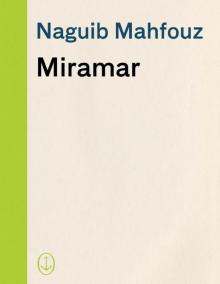 Miramar
Miramar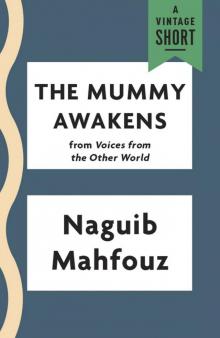 The Mummy Awakens
The Mummy Awakens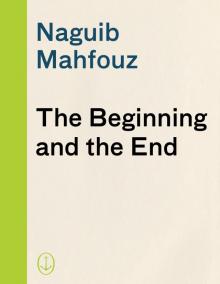 The Beginning and the End
The Beginning and the End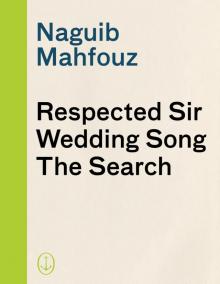 Respected Sir, Wedding Song, the Search
Respected Sir, Wedding Song, the Search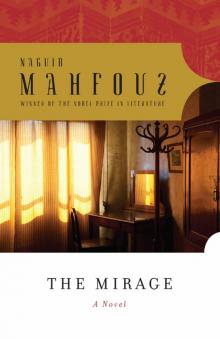 The Mirage
The Mirage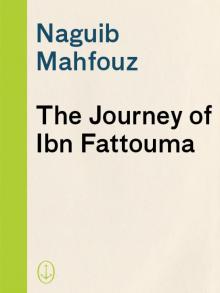 Novels by Naguib Mahfouz
Novels by Naguib Mahfouz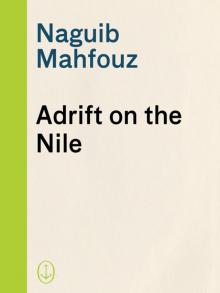 Adrift on the Nile
Adrift on the Nile Karnak Café
Karnak Café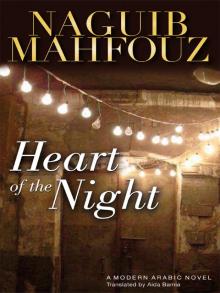 Heart of the Night
Heart of the Night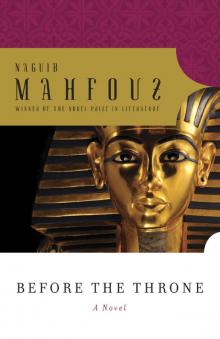 Before the Throne
Before the Throne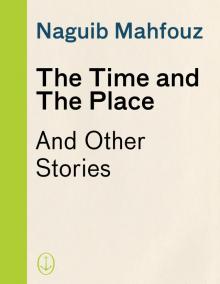 The Time and the Place: And Other Stories
The Time and the Place: And Other Stories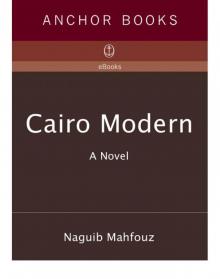 Cairo Modern
Cairo Modern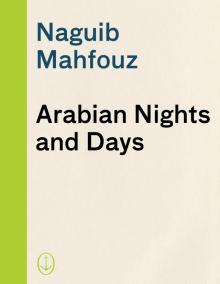 Arabian Nights and Days
Arabian Nights and Days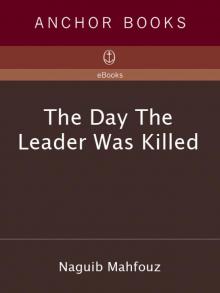 The Day the Leader Was Killed
The Day the Leader Was Killed Morning and Evening Talk
Morning and Evening Talk Three Novels of Ancient Egypt Khufu's Wisdom
Three Novels of Ancient Egypt Khufu's Wisdom Akhenaten: Dweller in Truth
Akhenaten: Dweller in Truth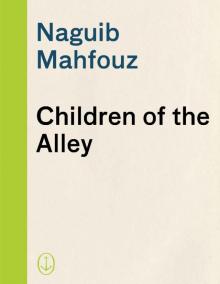 Children of the Alley
Children of the Alley Voices From the Other World
Voices From the Other World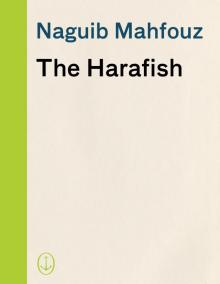 The Harafish
The Harafish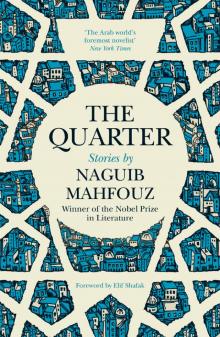 The Quarter
The Quarter The Seventh Heaven: Supernatural Tales
The Seventh Heaven: Supernatural Tales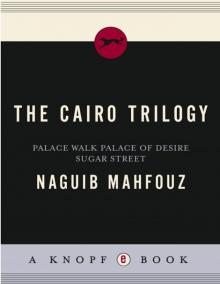 The Cairo Trilogy: Palace Walk, Palace of Desire, Sugar Street
The Cairo Trilogy: Palace Walk, Palace of Desire, Sugar Street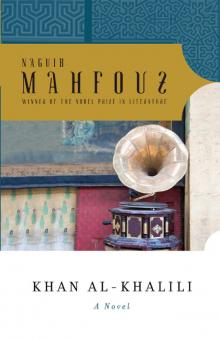 Khan Al-Khalili
Khan Al-Khalili Three Novels of Ancient Egypt Khufu's Wisdom, Rhadopis of Nubia, Thebes at War
Three Novels of Ancient Egypt Khufu's Wisdom, Rhadopis of Nubia, Thebes at War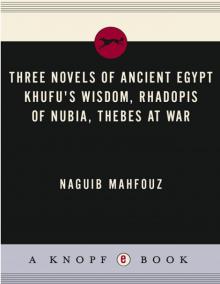 Three Novels of Ancient Egypt
Three Novels of Ancient Egypt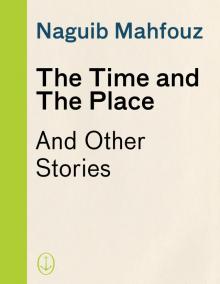 The Time and the Place
The Time and the Place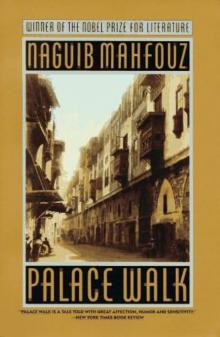 Palace Walk tct-1
Palace Walk tct-1 Akhenaten
Akhenaten The Seventh Heaven
The Seventh Heaven The Thief and the Dogs
The Thief and the Dogs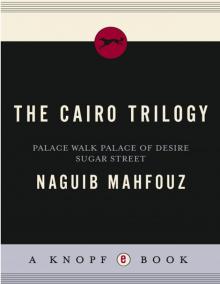 The Cairo Trilogy
The Cairo Trilogy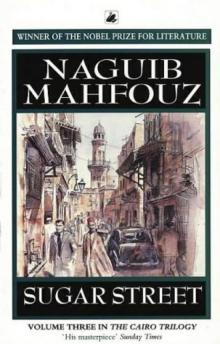 Sugar Street tct-3
Sugar Street tct-3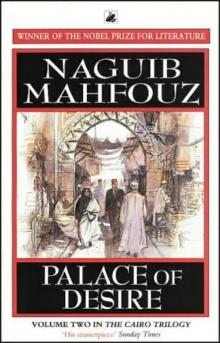 Palace of Desire tct-2
Palace of Desire tct-2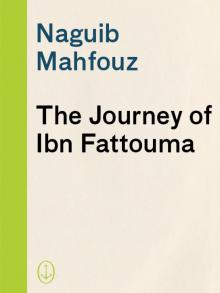 The Journey of Ibn Fattouma
The Journey of Ibn Fattouma